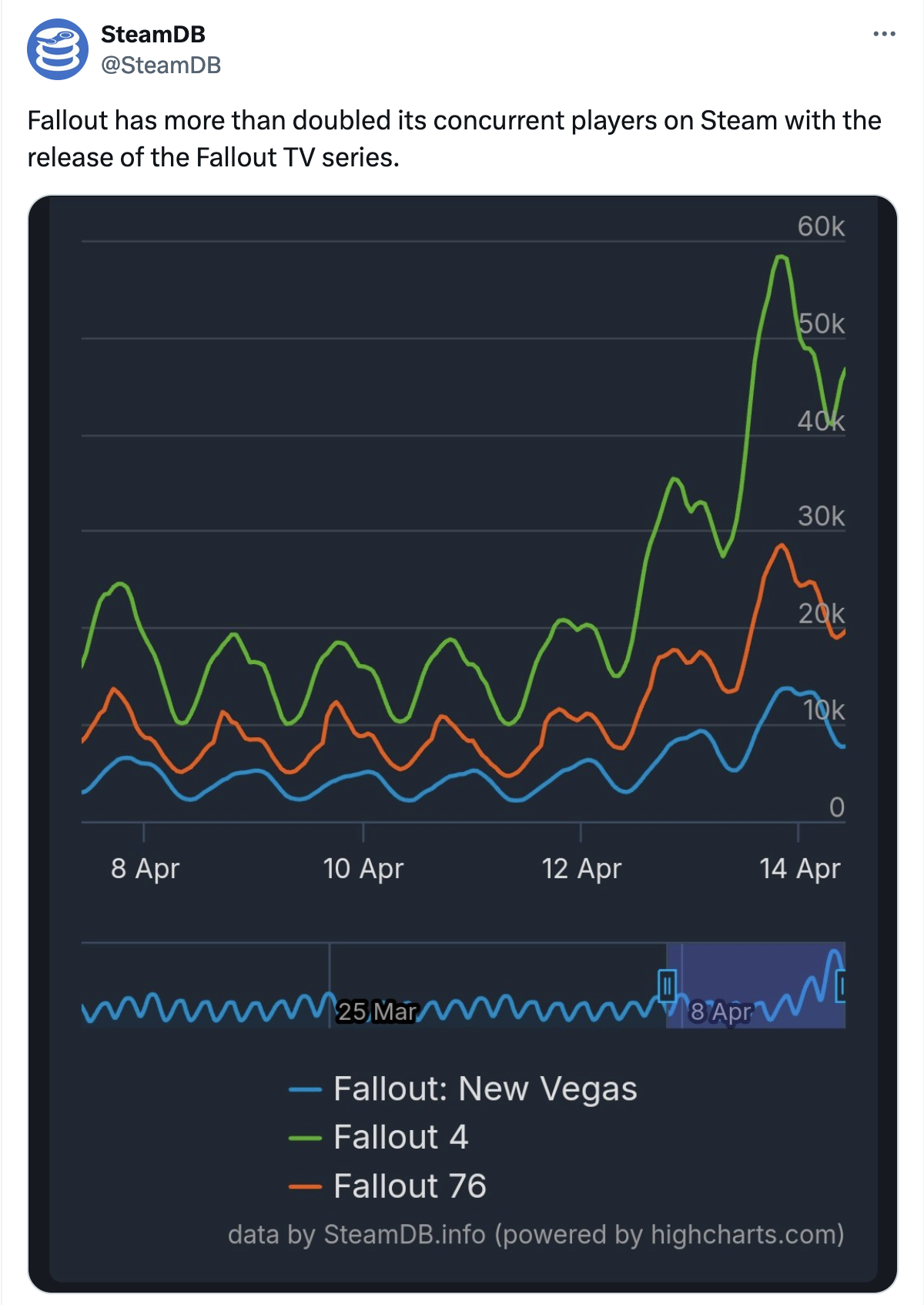
Amazon/MGM Studios
Long-time Fallout fans are used to long waits between titles, and, depending on their preferences, inconsistent results. But when Amazon’s Fallout series showed up on Prime and absolutely nailed it, it spurred a lot of players to crack open their libraries and commence some post-apocalyptic replaying. And maybe first-time playing, too.
Fallout 76, the online multiplayer title that is the most recent full release, saw perhaps the biggest delta. The game hit its all-time peak of 43,887 simultaneous players on Wednesday, April 17, according to SteamCharts, roughly one week after the Amazon series’ debut. For the year leading up to that peak, Fallout 76 had hovered around 7,000-10,000 players through most of 2024, and then jumped after the series’ debut. Of course, that number only counts PC players, and only those on Steam; the game, which launched simultaneously on consoles, and is available on Microsoft’s Game Pass, likely has many more players.
SteamDB, another Steam stats tracker, suggested on X (formerly Twitter) that the Fallout game series as a whole had more than doubled its concurrent player count by April 14.

On April 14, the most recent Fallout games were surging in player counts, and it has continued since.
More recent titles seem to have preference, though almost the entire run of Fallout games saw renewed interest over the past week. Fallout 3 – Game of the Year Edition from 2008 saw a 118% gain in Steam players, rising from an average of nearly 1,350 to a peak of about 7,300. The original isometric Fallout from October 10, 1997, (did you catch that Easter egg?) saw a higher spike relative to its quiet existence. It had averaged less than 200 simultaneous players until this month, when at one point nearly 3,000 players started clicking everywhere on their screen. Similar notable bumps occurred with Fallout 4, Fallout: New Vegas, Fallout 2, and even Fallout Tactics, though that was more like 30-ish players rising to just over 40.
-
Fallout 76 in the midst of its moment.
SteamCharts -
Fallout 3 GOTY is adding lots of players to its brown-green DC.
SteamCharts -
Preston Garvey has so many more people to alert to settlements in need of help in Fallout 4.
SteamCharts -
Fallout: New Vegas got a notable bump, too, and hopefully some of them are discovering the useful mods for that beloved but showing-its-age title.
SteamCharts
It certainly helps that most of the major Fallout titles are on deep sale on Steam at the moment, including a Franchise Bundle that gives you pretty much every PC game in the series.
While this makes a certain amount of sense for any video game series pushed to a much wider audience, I think the Fallout series in particular contains the elements that both burnish the games’ memories in players’ minds and also invite some “Where did this all come from?” curiosity. A more robust review of the series’ first season is likely to appear on Ars soon. But as a fan of the series since its inception, I was impressed, eager to see more, and, yes, tempted to dig in for one more outing as a Vault Dweller.
The show does a good job of making the wasteland’s factions seem complex, messy, and interesting. There are references galore to specific creatures, items, technologies, weapons, and esoterica that remind players of the great discoveries the series offers at its best. Most of all, the show captures, for me, the tone and flavor of the series, both in its first two ultra-arch, often-bizarre CRPG outings and through the Bethesda titles that were more straightforward but offered far more spectacle, combat, and just pure space to dig around in. For each player, there are Fallout titles that evoke their favorite aspects of the series, and the TV series seemed to me to touch on most of them.






















+ There are no comments
Add yours